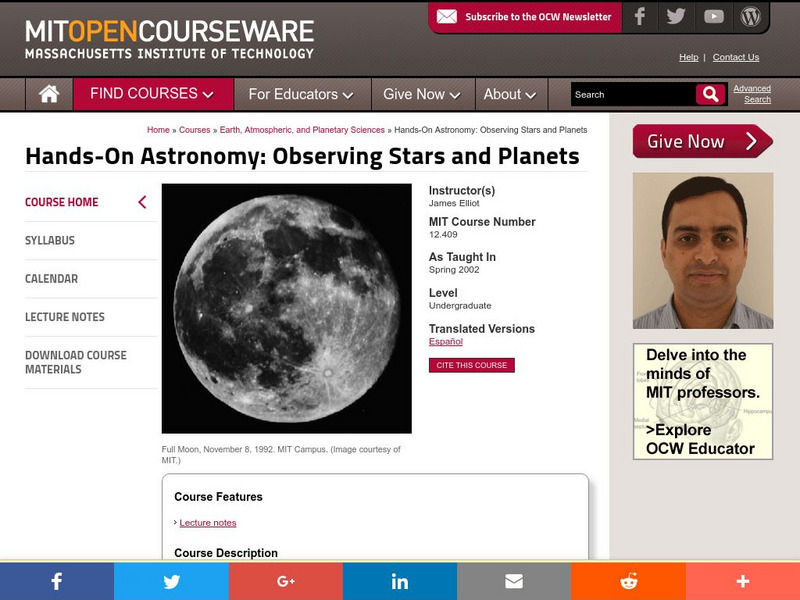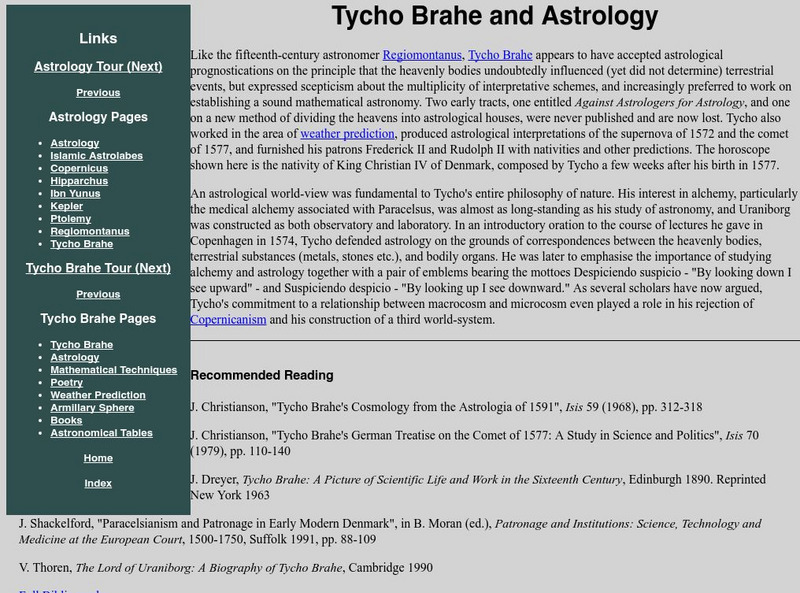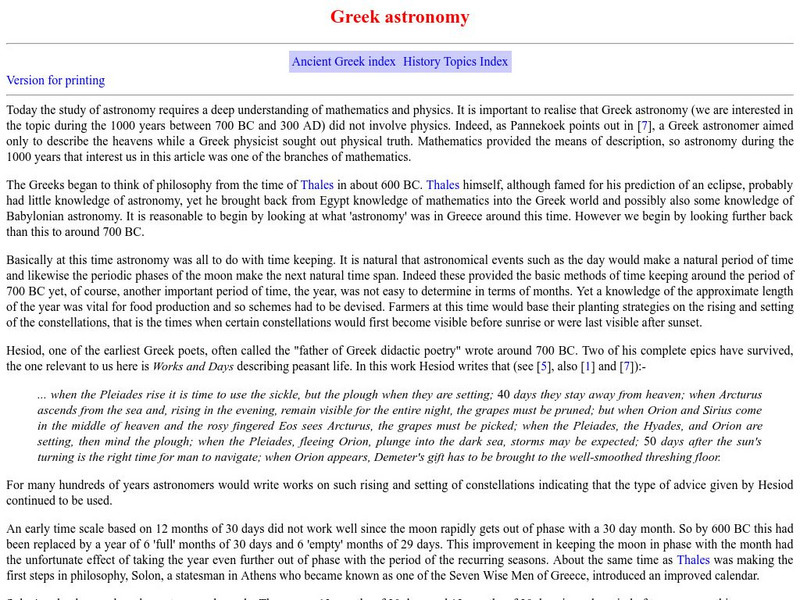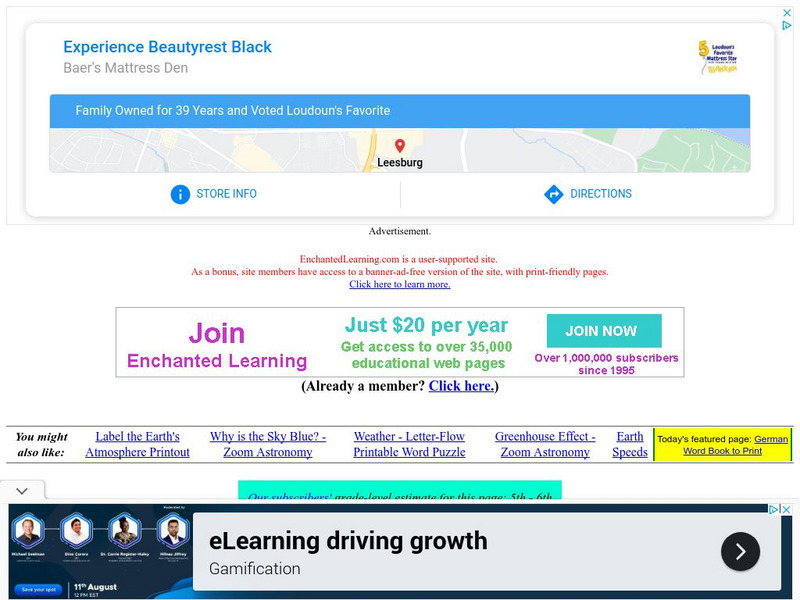Massachusetts Institute of Technology
Mit: Open Course Ware: Hands on Astronomy: Observing Stars and Planets
A university-level course in basic observational procedures in astronomy. Covers how to use a telescope, and includes lecture notes.
Ducksters
Ducksters: Space Science: Astronomy for Kids
Kids learn about astronomy, the study of outer space including the stars, planets, comets, black holes, and the Solar System. History and astronomers in this astronomy for teachers and kids section.
Enchanted Learning
Enchanted Learning: Zoom Astronomy
Where is our Solar System? How far away is the sun? What makes up the sun? Find out all you want to know about our solar system. This is a comprehensive on-line site about space and astronomy. Check out all of the excitement!
Other
Etymological Dictionary: Influences on Astronomy
An interesting look at the meanings of many of the words in mythology that have been used in English astronomical field. This resource lists the word, etymological and mythological root or character, and modern English meaning.
Other
Nrao: What Is Radio Astronomy?
This page contains an introduction to Radio Astronomy written by the National Radio Astronomy Observatory (NRAO). It contains some basic theory as well as frequently asked questions and teacher resources.
Other
U of Cambridge: Tycho Brahe and the Separation of Astronomy From Astrology
The subject of the paper is the shift from an astrology-oriented astronomy towards an allegedly more objective, mathematically grounded approach to astronomy. This shift is illustrated through a close reading of Tycho Brahe's scientific...
World History Encyclopedia
World History Encyclopedia: Greek Astronomy
Looks at the history of Greek astronomy from the 4th century BC on, and the major figures who contributed ideas. Includes a timeline of Greek science.
University of St. Andrews (UK)
University of St. Andrews: Greek Astronomy
Provides an overview of ancient Greek astronomy and the major figures who played a role in developing ideas about the Universe.
American Museum of Natural History
American Museum of Natural History: Ology: Astronomy: Are You Cut Out for Mars?
Do you have what it takes to go on a space mission to the Red Planet? Think you can handle it? Take this quiz to find out!
Enchanted Learning
Enchanted Learning: Zoom Astronomy: The Earth's Atmosphere
Site provides information on the Earth's atmosphere as well as offers additional information about Earth.
Other
National Radio Astronomy Observatory: Very Large Array
Home page of the NRAO Very Large Array Home Page. This site features an image gallery of photos taken with NRAO instruments and thorough information on radio astronomy.
Wikimedia
Wikipedia: Timeline of Solar System Astronomy
This site from the encyclopedia Wikipedia provides an in-depth timeline of important events in astronomy relating to the solar system are presented here. Links are also provided for additional information on related subjects.
Ducksters
Ducksters: Quiz: Renaissance Astronomy for Kids
History Questions: Renaissance Astronomy Quiz, Test, and WebQuest
Ducksters
Ducksters: Astronomy for Kids: The Planet Uranus
Kids learn about the ice giant planet Uranus of the Solar System including fun facts, mass, day, year, and distance from the Sun. Astronomy for kids and teachers.
Ducksters
Ducksters: Astronomy for Kids: The Planet Venus
Kids learn about the planet Venus of the Solar System including fun facts, mass, day, year, and distance from the Sun. Astronomy for kids and teachers.
Ducksters
Ducksters: History: Renaissance Astronomy for Kids
Kids learn about the science of astronomy during the Renaissance. Discoveries by Copernicus, Galileo, and Kepler.
Ducksters
Ducksters: Astronomy for Kids: Asteroids
Kids learn about asteroids in the science of astronomy. Large chunks of rock and metal that orbit the Sun including the asteroid belt, Ceres, and Vesta.
Ducksters
Ducksters: Astronomy for Kids: Glossary and Terms
Kids learn about the glossary and terms for the science of astronomy including words and definitions such as asteroid, comet, meteoroid, galaxy, eclipse, etc.
Ducksters
Ducksters: Astronomy for Kids: Comets and Meteors
Kids learn about comets and meteors in the science of astronomy including the coma and tail, meteorites, meteoroids, the Kuiper belt, and the Oort cloud.
Ducksters
Ducksters: Astronomy for Kids: Constellations
Kids learn about the constellations in the science of astronomy. These stars that form patterns when viewed from the Earth have been studied since ancient times.
Ducksters
Ducksters: Astronomy for Kids: Lunar and Solar Eclipses
Kids learn about lunar and solar eclipses in the science of astronomy including the umbra, antumbra, penumbra shadows as well as total, partial, and annular.
Ducksters
Ducksters: Astronomy for Kids: Space Exploration Timeline
Kids learn about the timeline of the history of space exploration including early astronomy, astronauts, spacecraft, planets, and the Moon.
Ducksters
Ducksters: Astronomy for Kids: Sunspots, Solar Winds, and Flares
Kids learn about sunspots, solar winds, and solar flares in the science of astronomy. What they are and how they affect Earth.
Ducksters
Ducksters: Astronomy for Kids: The Universe
Kids learn about the universe in the science of astronomy including expansion, size, dark matter and energy, age, and fun facts.
Other popular searches
- Astronomy and Space Science
- Astronomy Vocabulary
- Planets and Astronomy
- Astronomy Activity
- Science Astronomy
- Ancient Astronomy
- Astronomy Lesson Plans
- History of Astronomy
- Space Science Astronomy
- Space and Astronomy
- Astronomy Navigation
- Astronomy History

























